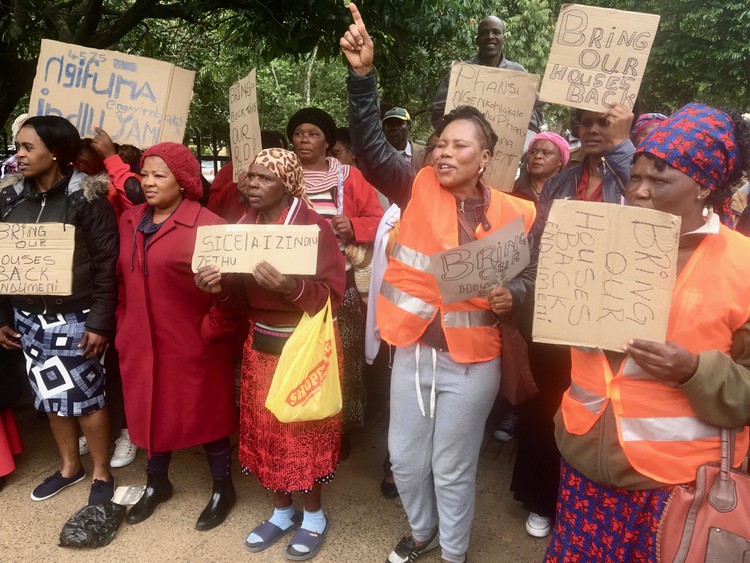Endumeni housing judgment is a warning to municipalities
Court finds allocation process irregular and corrupt

The ruling by the Pietermaritzburg High Court on 9 February against the Endumeni Municipality is a warning to municipalities which do not comply with their constitutional obligations on housing.
The Court found that the housing allocation process was irregular and corrupt and ordered the municipality to take steps to fix it and to report back to both the court and the affected residents.
The case was brought by the Endumeni Civic Association, which acts on behalf of residents in the area. It had three complaints: the municipality arbitrarily allocated houses by manipulating the housing lists; its allocation system was unclear; and its RDP housing allocation was corrupt. It accused municipal officials of impropriety, fraud and corruption.
The association said some residents’ houses were occupied by third parties. It had met municipal officials and local ward committees on several occasions without the issues being adequately addressed.
In June 2016, residents discovered that many allocated houses had been swapped without their knowledge or consent. The association requested a comprehensive list from the municipality indicating who had been allocated each house in the area. The list provided was incomplete and it seemed to have been tampered with. It emerged that several people’s houses had been rented out unlawfully by ward committee officials. After another meeting with the association, the municipality promised to investigate. But again, nothing happened, the association said.
As a result, the association decided to approach the court, asking the court:
- to find that the residents’ constitutional rights had been infringed;
- to order a review of the allocation of houses; and
- to order the municipality to investigate and report back to the court on how it intends to resolve the allocation crisis.
The municipality decided not to oppose the application, but the MEC for housing in KwaZulu-Natal did oppose the application. He argued that the orders sought were too vague and not practical and that it would be inappropriate and time-consuming for a court to monitor the process. He was concerned that an order to set aside and review the decision to allocate houses would be too broad and would affect other allocation decisions which were not irregular.
The Court decision
The court had to determine whether the municipality had infringed the residents’ housing rights due to irregularities in respect of the allocation process and to decide what should be done to resolve the problem.
The Court found that the municipality had failed to address the concerns of the residents even after numerous engagements with the civic association. The Court also found that the municipality had failed to “allocate appropriately RDP houses to rightful and qualifying recipients, to prevent fraudulent activities and manipulation of RDP housing lists, to resolve all the disputes relating to the allocation of the RDP houses including contradictory RDP housing lists and to take steps to resolve these issues.”
In this way the municipality had infringed its constitutional and statutory obligations in respect of the residents’ housing rights, the court said. Housing waiting lists had been manipulated; the housing allocation system and policies were unclear; and there had been corrupt allocation of RDP houses to RDP housing applicants.
The Court then had to determine whether it should grant a supervisory order. Orders of this sort are only granted in exceptional cases. The court found that in this case it was appropriate to grant a supervisory order, because there was reason to believe that the municipality would not comply completely with the court ruling.
After numerous engagements with the civic association, the municipality had failed to take any concrete steps to remedy the situation, the court said.
As a result, the court set aside the arbitrary, irrational and unreasonable allocation of RDP houses in the area and ordered the municipality to file a report with the court within two months. The report must identify all the housing applicants and explain whether each application had been accepted or rejected and why.
The municipality was also ordered to inform the residents what they should do to have their housing subsidies approved, to say what it would do to process housing applications correctly, and to set out reasonable and measurable targets.
The Court also ordered the municipality to engage with the residents in compiling its report and to publish it on the municipality’s website.
Ground Up recently reported a case brought by another residents’ association against the Ekurhuleni Municipality about irregularities in the housing allocation process.
The Endumeni judgment is in line with a trend by the courts to take a more active role in ensuring that municipalities comply with their constitutional obligations to provide residents with housing. It also serves as a warning to municipalities which fail to fix irregularities in the housing allocation process.
Support independent journalism
Donate using Payfast

Don't miss out on the latest news
We respect your privacy, and promise we won't spam you.
© 2018 GroundUp. 
This article is licensed under a Creative Commons Attribution-NoDerivatives 4.0 International License.
You may republish this article, so long as you credit the authors and GroundUp, and do not change the text. Please include a link back to the original article.
